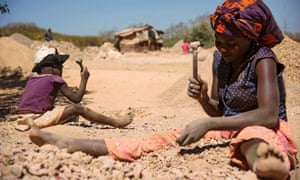Jonathan Watts: How the race for cobalt risks turning it from miracle metal to deadly chemical
If the prophets of
technology are to be believed, the best hope for solving the climate crisis is
ever more efficient
batteries. But the race to produce enough materials for this energy-storage
revolution is creating a host of other environmental problems, as
cobalt-producing nations like the Democratic Republic of the Congo, Zambia and
Cuba are discovering.

A woman and child break rocks at a copper quarry and cobalt pit in Lubumbashi, DRC.
Photograph: Junior Kannah/Getty
Lung disease and heart failure have been linked to high levels of this element, while the mines that produce it are blamed for devastated landscapes, water pollution, contaminated crops and a loss of soil fertility. Scientists are also investigating a possible link to cancer.
As with any chemical, the risks depend on the amount and duration of exposure. Cobalt is a metal that occurs naturally in rocks, water, plants, and animals. It is less toxic than many other metals. At low levels, it is beneficial to human health and is a component of vitamin B12. But the dangers of high doses are increasingly apparent. They were first discovered in the 1960s, when a Canadian brewer started adding cobalt to beer to ensure a consistently foamy head. A surge of fatal heart attacks among heavy drinkers, who also had poor diets, was linked to the cobalt additive. More recently, German doctors have questioned whether surgical implants containing cobalt might also be causing hypersensitivity reactions.
Cobalt is used in alloys, semiconductors, fertiliser, as a drying agent for varnish and enamel coating for steel. In the form of cobalt sulphate, it is particularly important in lithium batteries, where it acts as a cathode stabiliser....

A woman and child break rocks at a copper quarry and cobalt pit in Lubumbashi, DRC.
Photograph: Junior Kannah/Getty
Lung disease and heart failure have been linked to high levels of this element, while the mines that produce it are blamed for devastated landscapes, water pollution, contaminated crops and a loss of soil fertility. Scientists are also investigating a possible link to cancer.
As with any chemical, the risks depend on the amount and duration of exposure. Cobalt is a metal that occurs naturally in rocks, water, plants, and animals. It is less toxic than many other metals. At low levels, it is beneficial to human health and is a component of vitamin B12. But the dangers of high doses are increasingly apparent. They were first discovered in the 1960s, when a Canadian brewer started adding cobalt to beer to ensure a consistently foamy head. A surge of fatal heart attacks among heavy drinkers, who also had poor diets, was linked to the cobalt additive. More recently, German doctors have questioned whether surgical implants containing cobalt might also be causing hypersensitivity reactions.
Cobalt is used in alloys, semiconductors, fertiliser, as a drying agent for varnish and enamel coating for steel. In the form of cobalt sulphate, it is particularly important in lithium batteries, where it acts as a cathode stabiliser....
